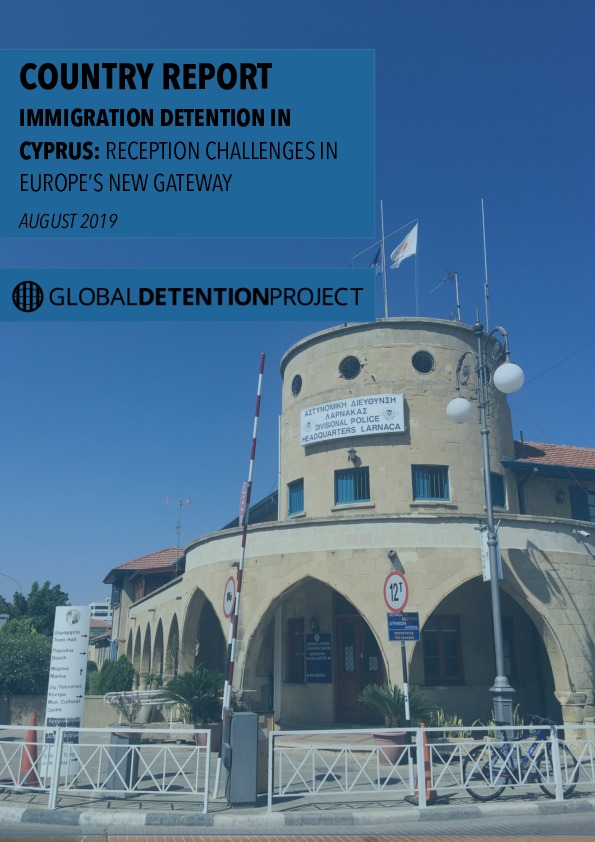While the concepts of “crimmigration” and “immcarceration” have received much scrutiny in the Global North, far less attention has been given to them in the context of South-South migration. This working paper helps address this gap by identifying distinctive aspects of crimmigration control in India and its connections with the governance of migration in wealthier countries. […]
Publications & Events
NEWSLETTER: The Contours of Crimmigration Control in India
The criminalisation of irregular migration through escalated enforcement of toughened immigration laws is often referred to as crimmigration or immcarceration. Detention and deportation are important aspects of such enforcement across the globe. While these processes have received much scrutiny in the Global North, far less attention has been given to them in the context of South-South migration. This […]

Cyprus: Reception Challenges in Europe’s New Gateway
Immigration Detention in Cyprus (2019 Report): Although the Republic of Cyprus is one of only a small number of EU member states that have yet to join the Schengen visa-free zone, the country is quickly becoming an important gateway for migrants and refugees as other routes into the EU have been blocked. With a small […]

Ireland: Can You Detain “Better” Without Detaining More?
Immigration Detention in Ireland (2019 Report): Compared to other EU countries, Ireland does not detain large numbers of migrants and asylum seekers—typically less than a dozen people at any given moment. However, the country’s use of prisons and police stations for immigration purposes has spurred widespread criticism for years. Human rights watchdogs, including from the […]

Meeting with the UN Working Group on Arbitrary Detention
On 13 August, the GDP attended a Working Group on Arbitrary Detention (WGAD) civil society meeting in Geneva. The open meeting provided an opportunity for civil society to exchange ideas with the WGAD on issues related to the group’s mandate. […]
Attack on Libyan Detention Centre an “Appalling Breach of International Law” – UN Network on Migration
In a statement released today, the United Nations Network on Migration has condemned the attack on Tajoura Detention Centre, Tripoli, which has killed at least 40 people and left more than 130 injured. […]

NEWSLETTER: June 2019
OUR LATEST PUBLICATIONS Immigration Detention in Portugal: Resettling Refugees, Detaining Asylum Seekers Unlike most EU states, Portugal has welcomed the arrival of refugees—even after the onset of the “refugee crisis” in 2015—and has announced ambitious resettlement schemes. On the other hand, Portugal’s detention policies have been the subject of repeated criticism. Asylum seekers lodging applications at […]

NEWSLETTER: World Refugee Day – Refugees and asylum seekers are increasingly punished, not protected!
In the last two months, the number of suicide attempts on Manus Island—home to Australia’s notorious offshore migrant facility where more than 800 refugees and asylum seekers are stranded after spending years in detention—has skyrocketed. According to @Shamindan, an asylum seeker documenting life inside the facility, there have been some 90 suicide attempts and self-harm incidents […]

Immigration Detention of Children: Is There an Alternative to Prohibition?
Children at the Heart of Human Rights University of Geneva Summer School, 17-28 June 2019 Around the world, children continue to be held in immigration detention, despite the fact that many authoritative rights agencies agree that detention is fundamentally at odds with their best interests. Even in some states where legislation prevents the detention […]

ISHR Human Rights Defenders Advocacy Programme
ISHR Human Rights Defenders Advocacy Programme Geneva, 20 June 2019 On 20 June, GDP staff met with participants from ISHR’s Human Rights Defenders Advocacy Programme. The 18 rights defenders are currently attending ISHR’s training programme which is designed to equip them with the knowledge and skills to make strategic use of the international human rights system. […]


